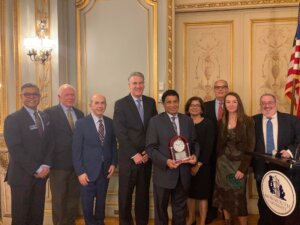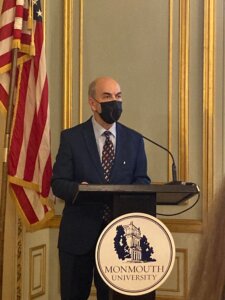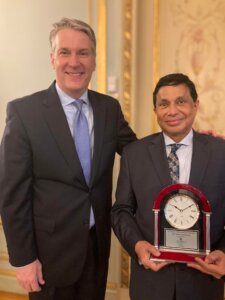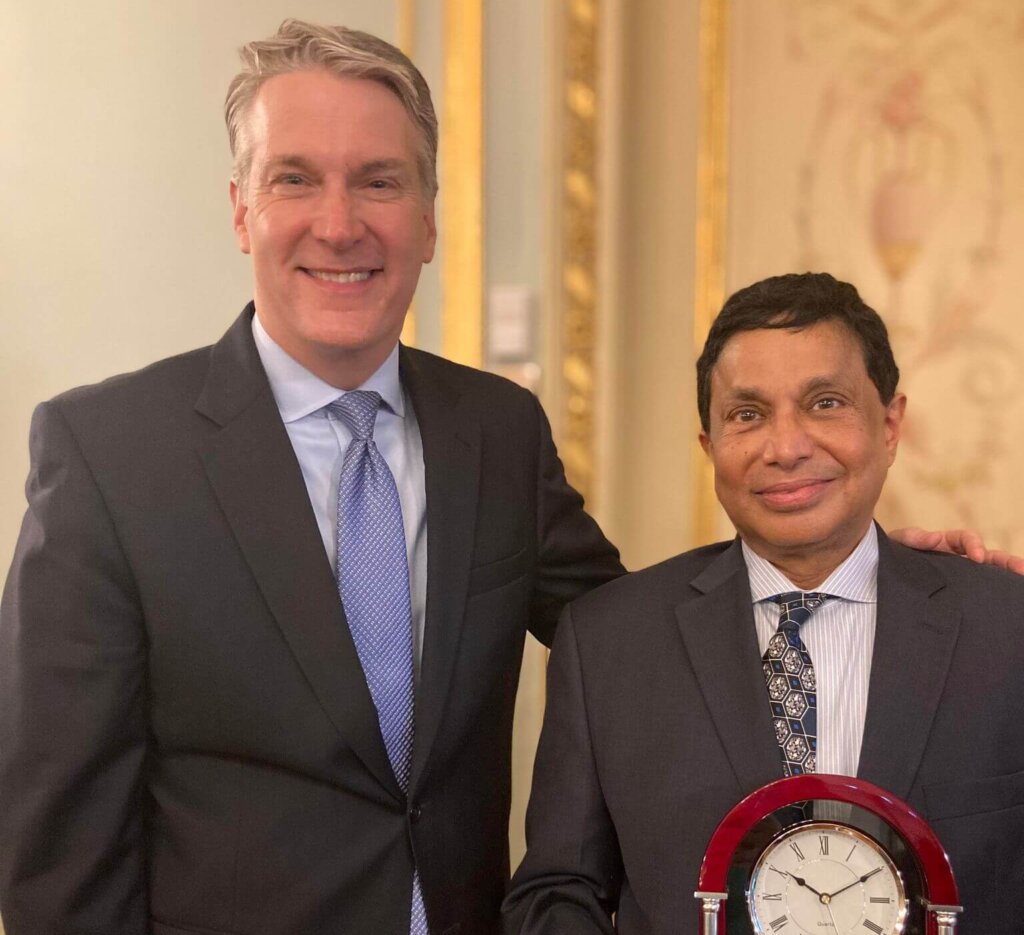By Grace Joyce,

On March 31, 2022, the Institute for Global Understanding (IGU) hosted the Global Visionary Lecture: From War to Peace and Human Dignity: The United Nations and a Transformative Global Order. The event was co-sponsored by the Freed Endowed Chair in Social Sciences. Ramu Damodaran, this year’s recipient of the Global Visionary Award, is the former Chief of United Nations Academic Impact (UNAI) and has held multiple roles within the UN throughout his distinguished career.
IGU Director Prof. Randall Abate began by providing some background information on the IGU and its work, specifically its ongoing efforts to promote strong relations with the UN and provide opportunities for faculty and students to engage in the UN’s work. President Leahy then provided his opening remarks. He discussed the significant role the IGU has played in promoting awareness of global affairs and pushing for greater cross-cultural understanding. President Leahy also hopes to strengthen Monmouth University’s partnerships with the UN and cultivate more strategic partnerships on and off-campus.
 Dr. Saliba Sarsar then provided a formal introduction of Mr. Damodaran and his accomplishments and career with the UN. In 1996, Ramu Damodaran joined the United Nations Department of Global Communications where he managed relationships with civil society, the creative community, and celebrity advocates, as well as publications. Former UN Secretary General Ban-Ki Moon appointed Mr. Damodaran to devise and lead UNAI in 2010. He served as UNAI Chief until his retirement in 2021. Mr. Damodaran also helped the IGU establish the UNAI Lecture Series several years ago. The IGU hopes to re-establish this important lecture series featuring prominent UN-affiliated speakers in the 2022-2023 academic year.
Dr. Saliba Sarsar then provided a formal introduction of Mr. Damodaran and his accomplishments and career with the UN. In 1996, Ramu Damodaran joined the United Nations Department of Global Communications where he managed relationships with civil society, the creative community, and celebrity advocates, as well as publications. Former UN Secretary General Ban-Ki Moon appointed Mr. Damodaran to devise and lead UNAI in 2010. He served as UNAI Chief until his retirement in 2021. Mr. Damodaran also helped the IGU establish the UNAI Lecture Series several years ago. The IGU hopes to re-establish this important lecture series featuring prominent UN-affiliated speakers in the 2022-2023 academic year.

After Prof. Abate presented the Global Visionary Award, Mr. Damodaran delivered an inspiring speech to a capacity crowd in the Julian Abele Room in the Great Hall and to a robust online audience. He focused on the role of universities and the idea of space. He discussed similarities between the UN and universities in that neither entity is transactional, but both act to serve the community, each other, and ourselves.
Mr. Damodaran especially emphasized the different types of spaces and their adaptability. When you have a physical space, it does not need to be confined to its original purpose, and spaces for human engagement and the unforeseen are essential for making justice and equality a reality. Human engagement allows for people to use their voice for what matters and, while there may be respectful disagreements, these should be used to gain new perspectives and bring people together to work for the common good. Space for the unforeseen has been extremely significant, as we have lived through the COVID-19 pandemic for the past two years and more recently we are witnessing the Ukraine crisis unfold. There needs to be better preparation and preventative action to assist in these cases to protect communities and create peace.
The lecture concluded with a Q&A session in which Mr. Damodaran answered the audience members’ questions about the different forms of space, and even the negative impacts that certain spaces such as online engagement may facilitate.

